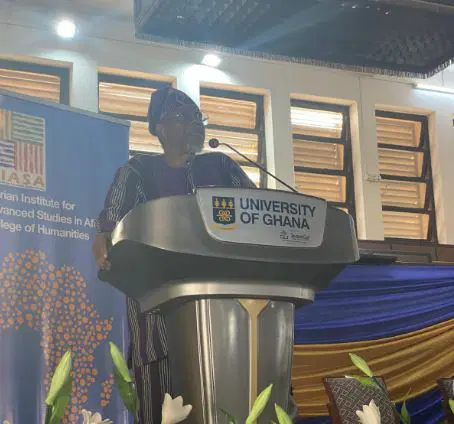Erudite historian, Professor Toyin Falola, on Tuesday, unveiled the African Ancestral Studies program during the 2024 Anton Wilhelm Lecture held at the University of Ghana. This transformative academic initiative places indigenous knowledge and spirituality at the forefront of African historical and cultural studies.
In his address, Falola underlined the need for a new approach to African studies that moves beyond traditional frameworks, which often marginalize Africa’s rich cosmological and philosophical systems. He argued that these indigenous knowledge systems, integral to African societies for centuries, have been overlooked or misrepresented in Western academia. The new program seeks to correct these imbalances by giving African spirituality, cosmology, and intellectual traditions the attention they deserve in global discourse.
He clarified that African societies have long relied on their ancestors’ knowledge to navigate life’s challenges, govern communities, and sustain moral and ethical values. By focusing on ancestral practices and cosmologies, the program aims to offer students a more holistic understanding of African life, integrating spiritual and intellectual traditions. This approach challenges the often secular, materialist views of African history promoted by mainstream scholarship, providing a framework rooted in indigenous epistemologies.
Falola pointed out that colonialism and its aftermath not only disrupted African societies but also distorted how Africa was perceived by the rest of the world. By centering indigenous knowledge systems, African Ancestral Studies will provide a platform for reclaiming Africa’s intellectual and spiritual contributions to the world, challenging historical inaccuracies that diminish Africa’s role in the development of global knowledge in areas like philosophy, science, and ethics.
He explained that the African Ancestral Studies program seeks to build on this legacy by emphasizing the resilience, adaptability, and diversity of African traditions. These traditions have not only survived but have thrived in the African diaspora, evolving into unique expressions of African identity in the Americas, the Caribbean, and other parts of the world. The program will explore how African beliefs and practices have traveled globally and how they continue to shape the lives of millions today.
Falola described the program as having a practical dimension, equipping students with ethical and philosophical frameworks applicable to contemporary global challenges. He argued that many of the crises facing the world today, such as environmental degradation, social inequality, and cultural alienation, can be addressed through African ancestral knowledge. These knowledge systems, which prioritize community, interdependence, and respect for the natural world, offer alternative solutions to the often exploitative and individualistic paradigms found in Western philosophies.
Falola expressed hope that by prioritizing African epistemologies, spirituality, and ethics, the program would not only correct historical misrepresentations but also serve as a source of empowerment for students and scholars alike, encouraging them to engage with African knowledge systems on their own terms.

